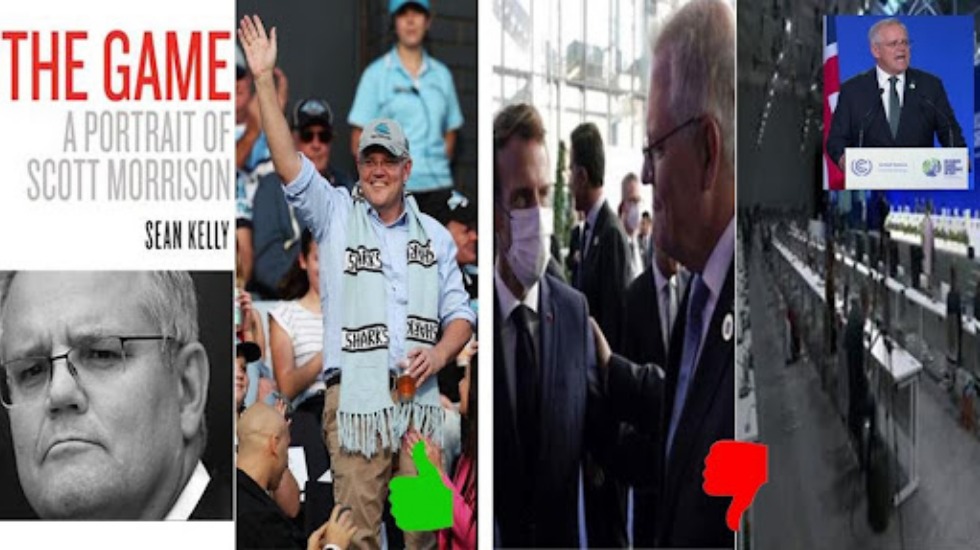Photos: (left to right) Black Inc. Books, ABC, Indian Express, SBS
“Sorry, world. We’re an utter mess over here. This week has been awful to watch for most Aussies.”
So wrote former Socceroo Craig Foster on Friday, though given our collective cringe over Scott Morrison’s implosions at the G20 and COP26 last week, any one of us could have penned that.
COP26, the United Nations Climate Change Conference in Glasgow, went about as badly as predicted, with Scott Morrison outlining his ‘Plan’ to get us to net zero by 2050 with no modelling, no binding legislation, heavy reliance on uninvented low carbon technology and a ‘review mechanism’ thrown in so the Nationals can blow it all up.
Morrison made his speech before a largely-empty auditorium, which spoke volumes, as did the display for carbon-capture technology at Australia’s COP26 pavilion – brought to you by fossil fuel company Santos.
However, the real action was on the undercard, with French President Emmanuel Macron hitting Morrison with a bilateral haymaker at the earlier G20 conference in Rome. “I don’t think, I know,” Macron told a reporter, when asked if he thought the PM lied to him about cancelling a $90 billion submarine deal.
Such extraordinary language in the walking-on-eggshells world of diplomacy showed the depth of anger in Paris over what it saw as treachery on Morrison’s part. Coupled with US President Joe Biden’s on-camera assertion he thought “France had been informed” of Canberra’s intention to scrap the subs deal, and that the handling of the issue had been “clumsy”, it was an horrific few days for the PM’s reputation.
It seems that, after three years of ducking, weaving and spinning like a Tasmanian Devil, Morrison’s record of hollow statements, gimmickry and, yes, treachery has finally caught up with him. A close ally of Morrison’s, former US president Donald Trump, knows all about that after racking up 30,573 false or misleading claims over four years before voters turfed him out last year.
“You can’t con people, at least not for long. Americans caught on pretty quickly that (former president Jimmy) Carter couldn’t do the job, and he lost in a landslide,” Trump said in The Art of the Deal. If only Trump had taken his own advice.

Sean Kelly’s new book, The Game (above) helps explain Morrison’s fall from grace which, truth be told, has been gathering pace throughout the course of this year. Kelly comes to several conclusions about the PM, the most telling of which are that he’s (i) a guru of messaging and narrative who (ii) treats government as a game (and policy as merely a means to win that game) and (iii) shows us little if anything of his inner self (this latter point is his Achilles’ heel, as I’ll explain later).
On the first point, Kelly describes copious cases of Morrison’s messaging strategy and the ample energy he’s put into mastering and developing it over a relatively brief, 14-year political career.
Seemingly everything that exits his mouth when there’s a microphone in front of it is calculated to improve his public image.
Rhetorical tricks are deployed systematically, such as his bemoaning in 2018-19 “the staged nature of politics” and setting himself up as the counterpoint to that, an “authentic”, rugby league-loving, curry-cooking daggy dad from that quintessentially ‘suburban’ part of Sydney, the Sutherland Shire. “Great to be here,” he told Sabra Lane of the ABC in 2018, before adding, unsolicited: “Go the Sharks.”
You’ll no doubt recognise some of Morrison’s other ubiquitous catch phrases, such as “how good is this?!” Kelly describes it as the “perfect vehicle for a branding exercise” in which Morrison’s ostentatious patriotism is over-egged and repeated to the point where no-one would dare question it.
A more sinister catch phrase deployed by Morrison is the term “quiet Australians”, a rip off of Richard Nixon’s “silent majority”.
With this phrase, the PM sought to divide those who were “thankful” for what they had from “angry noisy voices” on the left.
The key to Morrison’s success at this is repetition: his ‘authenticity’ got umpteen runs at interview as the new PM sought to define himself as ‘one of us’ in the lead-up to an election in 2019. By the time we went to the polls that year, scarcely anyone recalled the inconvenient truth that, prior to his Sutherland Shire metamorphosis, ‘authentic’ Morrison was a fan of rugby union (“the gentleman’s game”) from Bronte in Sydney’s affluent east.

Cartoon: John Shakespeare, The Age
Kelly’s second point is that Morrison regards government as a game (and policy as merely a means to win said game).
Perhaps the most vivid and disturbing case in support of Kelly’s thesis was the reopening of Christmas Island refugee detention centre in the lead-up to the 2019 election.
“Responding to his parliamentary defeat on the Medevac legislation, Morrison announced that (Christmas Island) would be reopened … to deal with the flood of arrivals the government was hysterically predicting,” Kelly wrote.
As with the Tampa crisis of 2001, News Corp outlets and radio shock jocks lined up to declare that tactics like these “would entrench the view of Labor as weak on border protection”. Miranda Devine was especially impressed: “that” is “how elections are won,” she wrote.
Morrison flew to Christmas Island himself in April of that year for the reopenig, in front of the cameras. All told, it cost taxpayers $180 million, there was no flood of boats, and a few months later – after the election – the centre was closed again.
“The reopening of Christmas Island had been (a) show staged by the Prime Minister,” Kelly wrote.
Clearly, Morrison saw scaring “quiet Australians” about Muslim refugees not only as a game, but as a game changer, just as the Tampa crisis was for John Howard in 2001.
Christmas Island is just one example of decision-making by the Morrison Government aimed simply at a political fix. A flurry of publicity-driven decisions in the lead-up to the 2019 election, including (per Kelly) “a quick fix to a controversial school funding issue … a summit (on the drought) and an inquiry (into aged care)” are among many other political fixes which failed to achieve what good policy might have.
Both the political fixes and the messaging have the same end in mind: improving Morrison’s image as statesman, protector, sports lover or family man. Nothing else seems to matter to this PM.

Morrison becomes mistake-prone, “menacing controlling wallpaper” when his image is under threat. Images: (left to right) Ramona Quazzola (via Twitter), Julia Banks (inset), News Corp.
This brings us to Kelly’s third point about the PM (and potential Achilles heel): he comes across as little more than a hollow collection of sound bites and catchphrases.
“When I was first approached by my publisher to write a book about Morrison, perhaps a biography, I said no; I simply could not summon up sufficient interest in the man,” he wrote.
“People aren’t looking for me, frankly, to conduct myself as if I’m sitting on Oprah’s couch,” Morrison once said. Thus, the cagey PM gives us little more than a Demtel Man facade to go by, and he defends that image and the messaging behind it ferociously.
That need to stay on-message and on-brand can be compulsive at times, rearing its head in seemingly-innocuous moments like friendly radio spots. When an interviewer jokingly accused Morrison of jumping on the Collingwood bandwagon, the PM immediately raised his voice and spoke over him: “I’m not a phoney, I won’t pretend to be something I’m not, I am who I am, when I back something I’m all in, I am never going to be someone I am not, I’m not going to be inauthentic.”
There it was again: the “authentic” daggy dad from the Sutherland Shire who would “always” be loyal to his chosen team and preferred football code. Nonetheless, it was both odd and telling how manic and repetitive his assertions were when someone had dared scratch the surface.
In moments more threatening to his image, the PM has shown an ability to up his game. Perhaps Morrison’s first big test as PM came from the bushfires that ravaged Australia in late 2019: eviscerated in the media for both his response and his ambivalence on climate change, Kelly wrote that the PM found his usual game-playing failing him, and “the option was open to him to turn away from the game and acknowledge reality”.
PLEASE HELP US CONTINUE TO THRIVE BY BECOMING AN OFFICIAL FOOTYOLOGY PATRON. JUST CLICK THIS LINK.
“Instead, he embraced the game more fervently,” Kelly wrote, seizing on American misinformation put out during bushfires there, attacking environmentalists who opposed the clearing of ‘fire hazards’.
“Rather than returning to the world as it was (Morrison) helped create a new, fictional world, and invited others to join him there,” Kelly wrote.
It worked. In late March 2020, Newspoll reported that 56 per cent of respondents believed the main cause of the fires’ severity wasn’t climate change, but instead a failure to carry out adequate hazard reduction.
In more challenging circumstances still, the PM has shown he’ll go to just about any lengths – some of them self-defeating – to preserve his image. After LNP staffer Brittany Higgins and backbencher Julia Banks quit and levelled accusations ranging from bullying and intimidation to sexual assault, there were campaigns of ‘backgrounding’, in which damaging information was leaked against both.
Later, on the same subject of sexual misconduct within the walls of Federal Parliament, we witnessed a truly bizarre performance from Morrison. In the space of a few moments during an April presser, the PM produced close to his full repertoire as he was reduced – for the first time as Prime Minister – from tearful ‘husband and father’ to snarling attack dog.
“Criticise me if you like for speaking about my daughters, but they are the centre of my life … and to them I say to you girls, ‘I will not let you down’. There has never been a more important time for women to stand in this place,” he croaked.
Even Sky News wasn’t buying it. Andrew Clennell accused the LNP government of losing control of its staff, at which the Prime Minister launched an attack on its parent company, News Corp, over the workplace bullying of a female employee there.
“So, let’s not all of us who sit in glass houses here start getting into that,” he warned. Within hours, Morrison was on the bottom of a pile-on the likes of which he’d never experienced: upset over his attack on them, even normally friendly News Corp outlets joined in.
It was perhaps the first time since the 2019 bushfires that Morrison had completely lost control of the narrative, but this time he prevailed at a bureaucratic level. “(Morrison) ordered a review. The review was delayed. The final result – a new code of conduct for the party – was criticised by those women for being close to useless,” Kelly wrote.

As Donald Trump (above) knows all too well, the con can’t go on forever. Sooner or later the punters will be onto you, the walls will close in on you and, in this ‘game’ the PM’s playing, you finally run into opponents even you can’t handle.
So it was when a perfect storm of diplomatic derision descended on Morrison at the G20 meeting in Rome a week ago, France accusing the PM of flat out lying and America seemingly in agreement.
“Scott Morrison’s trip blown up by French grenade” and “Biden’s swipe at Australia’s ‘clumsy’ subs handling” were among the damaging headlines.
Even the journos were onto Morrison, and not a moment too soon. “Slipperiness is his defining characteristic (and) it was never more on show than this week as (the PM was) openly branded a liar by France over submarines,” Hugh Riminton wrote in The Guardian.
“If slipperiness defines him, it is also his primary political skill. As Turnbull, Dutton and now Macron can attest, those who have underestimated Morrison have been left clawing at the open air. Less chameleon than oiled seal, he has already slipped them by.”
Quite the indictment, these words weren’t that far removed from the rest of the non-News Corp commentary. Coupled with footage showing other leaders seemingly avoiding Morrison at all costs, Rome was nothing short of a nightmare for a PM obsessed, last week, with playing the role of ‘international statesman’:
Scott no friends.
(and no climate policy either). #auspol @AustralianLabor pic.twitter.com/AaFKeMsgef
— Patrick Gorman MP (@PatrickGormanMP) October 31, 2021
What was Morrison’s response? “I’m not going to cop sledging of Australia; I am not going to cop that on behalf of Australians,” Morrison said, knowing full well Macron’s only gripe was with him.
Then there was the ‘backgrounding’, of course, although this time it was against a nation state that could fight back, not a couple of relatively powerless women.
A text from Macron to Morrison leaked to friendly outlets on Tuesday read: “Should I expect good or bad news for our joint submarines ambitions?” The leaking of this text, seemingly to muddy the waters over who lied, sent relations with France to a new low.
It was a reckless, self-defeating bid to mollify Morrison’s obsession with controlling of the narrative. Not only did the leaked text fail to belie French claims they were blindsided on the submarine deal, but it enraged Paris at a time when there’s a free trade deal with Europe on the line.
Kelly’s take on Morrison when he’s under such pressure is illustrative. “(The PM) had been accustomed to acting as though the whole world were at his feet,” he wrote.
“A politician more able to look outward, to take into account others might have been able to open themselves in this moment (but) Morrison (struggles) to understand the implications beyond himself.”
This is going well…Not. When you’re in a hole Scotty, it’s usually time to stop digging. But no – there’s not a single foreign policy and national security interest that Morrison wouldn’t shred in order to keep the Liberal Party right wing nut jobs happy. https://t.co/JJ2IicGrdP
— Kevin Rudd (@MrKRudd) November 2, 2021
After months struggling to get a bead on Scott Morrison while researching The Game, Kelly thinks he finally broke through with an assist from the Old Testament. “Despite the immense dramas of his brief time in the prime ministership, he remains a public character,” Kelly wrote.
Like King David in 1 Samuel, “Morrison is a practical man, who will not conduct himself as though he’s sitting on Oprah’s couch. We know him from his actions, but that is as far as we are allowed to go.”
Columnist and former Howard and Costello senior adviser Niki Savva describes The Game as “a forensic analysis” of the PM. A forensic psychological analysis of Morrison’s traits – ‘sleeping like a baby’ after ruthlessness, method acting the role of daggy suburban dad for political benefit, the vacuum behind the public profile, the transactional conduct – take us well beyond the narcissism of King David.
The PM’s ability to shapeshift may not stave off termination (above). Movie Clip: Tri-Star Pictures.
It would be foolhardy to write Scott Morrison’s obituaries just yet. In election mode, the PM’s campaigning guile and elasticity on issues like climate change (where his ‘Plan’ for net zero emissions paints him, astonishingly, as an environmental champion) or COVID-19 (where the onus to ‘open up’ has been placed squarely on Labor states) mean he could yet, at the forthcoming election, pull off the kind of improbable victory he achieved in 2019.
Backed by an overwhelming majority of Australia’s corporate media and boasting a formidable capacity to adjust his public persona to the moment, the PM will privately fancy his chances of holding onto power. But his humiliation last week at the hands of Macron and Biden has robbed Morrison of the one image facet he craves most: authenticity.
Certainly, Savva thinks he’s in trouble: “If the election becomes a referendum on Morrison, he will lose. If it’s about character, trust or integrity, he will lose,” she wrote. PMs have only a finite supply of political capital when they first take office; much of Morrison’s was exhausted as his lies caught up to him.
In his book, Kelly refers to Morrison as a “flat character”, a literary term for a simple caricature based around one or two ideas or qualities. The PM’s flat character is that of an authentic, “can-do champion of the middle class”, repeated over and over.
A more apt term, in Morrison’s case, might be “hollow character”.
What our hollow PM’s going through right now is the kind of stress test you see in physics. When an object is hollow, those stress tests don’t end well.











